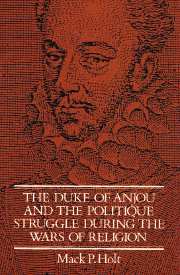Book contents
- Frontmatter
- Contents
- List of maps
- Preface
- Abbreviations
- Introduction
- 1 Prologue: civil war and the early years of François de Valois, 1555–72
- 2 From St Bartholomew's Day to the death of Charles IX, August 1572–May 1574
- 3 War and peace, May 1574–May 1576
- 4 The Estates-General and the renewal of civil war, May 1576–September 1577
- 5 Overtures from the Netherlands, September 1577–January 1579
- 6 Civil war, marriage, and more overtures from the Netherlands, January 1579–December 1580
- 7 Ménage à trois: Elizabeth, Anjou, and the Dutch Revolt, January 1581–February 1582
- 8 Turmoil in the Netherlands, February 1582–January 1583
- 9 ‘The ruin of France’, January 1583–June 1584
- Appendices
- Select bibliography
- Index
1 - Prologue: civil war and the early years of François de Valois, 1555–72
Published online by Cambridge University Press: 15 December 2009
- Frontmatter
- Contents
- List of maps
- Preface
- Abbreviations
- Introduction
- 1 Prologue: civil war and the early years of François de Valois, 1555–72
- 2 From St Bartholomew's Day to the death of Charles IX, August 1572–May 1574
- 3 War and peace, May 1574–May 1576
- 4 The Estates-General and the renewal of civil war, May 1576–September 1577
- 5 Overtures from the Netherlands, September 1577–January 1579
- 6 Civil war, marriage, and more overtures from the Netherlands, January 1579–December 1580
- 7 Ménage à trois: Elizabeth, Anjou, and the Dutch Revolt, January 1581–February 1582
- 8 Turmoil in the Netherlands, February 1582–January 1583
- 9 ‘The ruin of France’, January 1583–June 1584
- Appendices
- Select bibliography
- Index
Summary
When the fourth and last son of Henry II and Catherine de Medici was born in the royal château at Fontainebleau on 18 March 1555, the kingdom of France was at war with Spain, a conflict that had been almost continuous since Charles VIII invaded Italy in 1494. Despite a peace treaty signed by both countries at Cateau-Cambrésis in 1559, this Franco-Spanish rivalry became even more intense towards the end of the sixteenth century. Indeed, it was only after another century of fighting that Louis XIV emerged triumphant over the degenerating Spanish Habsburgs. During the last half of the sixteenth century this rivalry proved to be the most pivotal of all the external factors that permeated the French civil wars. The constant threat of Spanish invasion – from across the Pyrenees or from the Spanish Netherlands – combined with the desire to stay out of another war with Spain at all costs, formed the fulcrum of French foreign policy until the 1590s. The activities of this last Valois prince, the future duke of Anjou, played a critical role in this stormy rivalry. Moreover, in the early 1580s, when he sided with the Dutch rebels in their revolt against Philip II of Spain, this young prince almost singlehandedly brought France and Spain back to the brink of open war.
In addition to the war with Spain there were two other problems which beset the French monarchy in 1555, problems that were never successfully resolved in the duke of Anjou's lifetime.
- Type
- Chapter
- Information
- Publisher: Cambridge University PressPrint publication year: 1986



